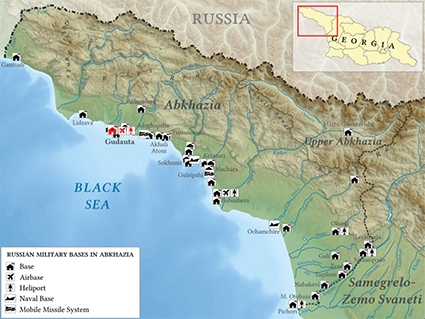The Story of One Georgian Village
About 330 kilometers (roughly 200 miles) west of the Georgian capital of Tbilisi lies the city of Zugdidi, the administrative center of the country's Samegrelo region. Another 10 kilometers or so west of Zugdidi, Georgian government control ends and the breakaway territory of Abkhazia begins. This region declared its independence in the early 1990s, and, following a war with Georgia, Russia recognized it as independent in 2008. The Enguri River delineates about one-third of the line of demarcation between Georgia and Abkhazia, leaving only a handful of connection points between the two. One bridge leads to the village of Khurcha – the only settlement beyond the river that remains under Official Tbilisi's control.
Crossing the river into Khurcha, I was suddenly struck by how advantageous Abkhazia's geographic position is compared with that of South Ossetia, another breakaway Georgian territory. South Ossetia lacks natural barriers to defend it. Abkhazia, by contrast, is buffered by the Enguri River as well as the Kodori Gorge — a narrow passage in the territory's northeast that Abkhaz forces can close off to keep out Georgian troops.
Near the village is the first Russo-Abkhaz military outpost, adorned with signs warning visitors to stop and stand at the end of this road. Speaking with Khurcha's residents, I gathered that these military outposts, and the guards who man them, are a source of even greater concern for locals than the prospect of losing territory. In May 2016, an Abkhaz outpost guard killed a Georgian national in Khurcha; many witnesses claim the guard crossed into the village from Abkhazia.
Abkhazians are allowed to cross into Georgian territory over the bridges. Many Abkhazians travel to Samegrelo for business or to seek medical treatment in Tbilisi, since it is a more convenient and affordable option than traveling to Russia. In fact, the Georgian government has built a number of hospitals for Abkhazians in need of medical services. Visitors from Abkhazia's Gali district can more or less easily travel to Zugdidi. Sometimes on the way back into Abkhazia, guards ask them to pay 50 GEL (about $20) for entrance. The amount demanded varies depending on which guard is on duty, and some charge as much as 100 GEL: a big sum for the locals. Overall, the line of demarcation is under tight control, which also depends on internal instability in Abkhazia.
In Khurcha, it also becomes clear that the passage over the Enguri bridge, as well as other places, is restricted. Abkhazians use unofficial routes to enter Georgia in search of better financial and health care opportunities. Fearing a mass exodus, Abkhaz President Raul Khajimba announced in an official statement that Sukhumi would crack down on movement from Abkhazia. As it is, Sukhumi has made it onerous for travelers to get the necessary documents to leave the breakaway territory.
In Gali, a massive distribution campaign of Russian passports to ethnic Georgians living in Abkhazia is ongoing. The campaign sometimes stops due to financial constraints. Russia's economic problems could also explain why Abkhazia has been receiving limited funding from Moscow lately, much to the detriment of its coffers. In other ways, however, Moscow's influence in Abkhazia is strong. There have been reports that the Abkhazians began appointing ethnic Abkhazians to many government positions that ethnic Georgians had traditionally filled. The Georgian language has been almost entirely replaced by Russian in the classroom, even in areas with large Georgian populations. Many Abkhaz schools teach only an hour of Georgian language and literature per week, causing parents in the area to consider relocating to Samegrelo.
The location of Khurcha village says a lot about the Abkhaz problem. The geography explains why Abkhazia is insular and this creates disadvantages. A major problem is that geographically Abkhazia is separated from Russia by the Caucasus mountain range which essentially precludes any possibility of Abkhazia joining Russia in the longer term. Relations between the two might prosper, but that is unlikely to change the constraints posed by geographic conditions.
By Emil Avdaliani
Photo: Russian military bases in Abkhazia (2011-2016). Source: Wikipedia












